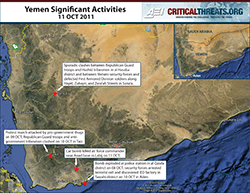Violence in Yemen continues outside of the capital as different opposition groups seek to gain power. Attacks have targeted government and military officials in the south, particularly in Aden and Lahij. Al Qaeda-linked militants have strongholds in Abyan governorate, where the Yemeni military has been unable to regain control.
A car bomb killed a Yemeni air force commander in Lahij. The commander, Colonel Amin al Shami, died when his car exploded near Anad base in the governorate.
 |
Protests in Taiz turned violent. Thousands of women marching in honor of Tawakul Karman in Taiz were attacked by pro-government thugs on October 9. At least twenty women were injured. Protesters then gathered at Thawra (Revolution) Hospital in the city to support the women on October 10. Government security forces attempted to disperse the crowd. Clashes between Republican Guard soldiers and anti-government tribesmen injured at least three people when the Yemeni troops attempted to enter Rawdah district on October 10. Gunfire is regularly exchanged in Taiz between government troops and anti-government tribesmen.
A bomb exploded at a police station in Aden’s al Qawla district. The October 8 attack killed a soldier and injured seven others. Security forces fought with anti-government demonstrators as they attempted to take down roadblocks in the city. Yemeni security forces arrested a terrorist cell in Tawahi district in Aden. Security forces uncovered a factory to manufacture improvised explosive devices.
Al Qaeda in the Arabian Peninsula (AQAP) released a eulogy for Anwar al Awlaki and those who were killed in the September 30 U.S. airstrike in Yemen. AQAP listed Samir Khan, Abu Muhsin al Marbi, and Salim al Marwani as Awlaki’s companions who were killed with him. The eulogy called on Yemenis to add the goal of “liberation from the subordination to the West” to the revolution. The eulogy ended with a threat: “The blood of the Sheikh [Awlaki] and his brothers will not go in vain; there are heroes behind him who do not sleep under oppression and they will retaliate soon . . . . We and the Americans are at war.” (Post obtained and translated by SITE.)
Yemen’s opposition bloc, the Joint Meeting Parties (JMP), has called for a UN Security Council resolution on the political crisis in Yemen. JMP spokesman Mohammed Qahtan noted that regional negotiators had hit a wall and that it was time for the international community to act. The European Union reiterated its call for President Ali Abdullah Saleh to sign the Gulf Cooperation Council initiative without additional conditions on October 10. Saleh gave a speech on October 8 in which he said, “I reject power and I will continue to reject it, and I will be leaving power in the coming days.” The Deputy Minister of Information Abdul Janadi clarified that Saleh will not step down until negotiations are concluded.
Protesters in Sana’a renewed calls for President Ali Abdullah Saleh to step down. Sporadic violence has occurred in Sana’a. There are reports of exchanges of fire between Hashid tribesmen in al Hasaba district and Republican Guard forces, as well as fighting between defected First Armored Division soldiers and government troops along Hayel, Zubayri, and Zera’ah Streets in Sana’a.
The ongoing political crisis in the capital has placed the Yemeni state at risk of a broader armed conflict. Further, the Yemeni state has been undergoing fragmentation. Al Qaeda has seized control of territory in south Yemen and the current situation has increased the organization’s operating space in the country.
